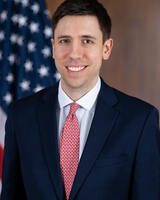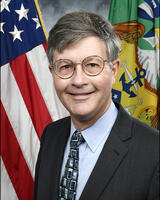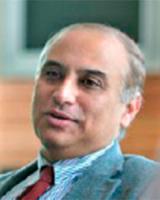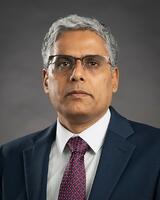
| Speakers and Panelists |
|---|

Travis Hill Travis Hill is the Acting Chairman of the FDIC Board of Directors. He has served in this role since January 20, 2025. He was sworn in as Vice Chairman of the FDIC on January 5, 2023. Mr. Hill previously worked at the FDIC from 2018 to 2022, as Deputy to the Chairman for Policy and, before that, as Senior Advisor to the Chairman. In these roles, among other responsibilities, he oversaw and coordinated regulatory and policy initiatives at the agency and advised the Chairman on regulatory and policy matters. Prior to joining the FDIC, Mr. Hill served as Senior Counsel at the United States Senate Committee on Banking, Housing, and Urban Affairs, where he worked from 2013 to 2018. In this role, he participated extensively in the drafting and negotiating of numerous bipartisan bills. Before working at the Senate, Mr. Hill worked as a policy analyst at Regions Financial Corporation from 2011 to 2013. Mr. Hill received a Bachelor of Science from Duke University, where he studied economics and political science, and a Juris Doctor from Georgetown University Law Center. |

Tania Babina Professor Tania Babina is an Associate Professor at the Robert H. Smith School of Business at the University of Maryland. She is also an affiliate of the National Bureau of Economic Research (NBER) and a Research Fellow at the Centre for Economic Policy Research (CEPR). Prior to joining Maryland, she was a professor in finance at the Columbia Business School. In her research, she studies the drivers of innovation, entrepreneurship and technological change and their economic impact on firms, workers and broader society. In her prior work, she examined the impact of financial crises on innovation and entrepreneurship, as well as the drivers and economic impact of fintech. More recently, she has done research on measuring the economic impact of recent technological developments, particularly artificial intelligence (AI) technologies: she has research papers examining AI’s impact on firm performance, labor composition, and changes in firm risk. Indicating the significance of this line of research, her paper on AI’s impact on firm performance was the most cited paper published in the top three finance journals in 2024. Her work has been published in top academic finance and economics journals, received numerous awards, and has been cited in the Financial Times, Washington Post, and The New York Times, among others. Her work has had an influence on economic policy. Her research was cited in major recent US regulations on Open Banking and in the government assessment of the UK Open Banking regulation as well as in the US White House Economic Report of the President. She supports the finance research community by organizing major research conferences, such as the Labor and Finance Conference and the AI in Finance Conference (2024, 2025). She received a Ph.D. in Finance from the Kenan-Flagler Business School at the University of North Carolina, a Master’s of Finance at the University of Alabama, and a Bachelor’s in Economics from the National Technical University KhPI, Ukraine. In terms of teaching, Professor Babina has taught Entrepreneurial Finance and Corporate Finance courses. |

Isabella Brancaccio Isabella Brancaccio is a fourth-year Ph.D. candidate in Accounting at Bocconi University and currently a visiting student at the Kellogg School of Management at Northwestern University. Her research interests are in banking, debt contracting and financial reporting. In particular, her work focuses on the economic consequences of financial disclosure in financial markets. |

Mark Carey Mark Carey is Senior Policy Advisor at the Office of Financial Research. He was a Senior Economic and Policy Advisor at the Federal Reserve Bank of Cleveland through the end of 2023, where he produced research and policy analysis on matters related to financial stability. From early 2018 through late 2021 he was co-President of the GARP Risk Institute, which is part of the Global Association of Risk Professionals, the leading professional association for risk managers. Previously, Mark was Associate Director in the Division of International Finance at the Federal Reserve Board in Washington, DC, leading some of the Board’s work on issues related to financial stability. Recent work included employee compensation practices in the financial services industry and issues related to systemic risk and the 2007-09 financial crisis. Earlier, he was a founding-father of Basel 2. Though he is a research economist, he has frequently worked closely with bank examiners. He has written a lot of technical papers about credit risk and also about corporate debt and corporate finance. Mark was co-director of the National Bureau of Economic Research’s Risks of Financial Institutions Working Group from 2000-2023, which was a mixed group of academics and financial professionals that focused on risk management at financial firms. He is an Editor of the Journal of Financial Services Research and an Associate Editor of the Journal of Financial Intermediation. His Ph.D in economics is from Berkeley and his undergraduate degree in economics is from Oberlin College. |

Helena Carvalho Helena Carvalho’s research focuses on banking competition and regulation, using both theory and empirics. Her research interests include financial intermediation, corporate finance, and industrial organization. She is a PhD student in Financial Economics at University College London, a PhD visitor at the Bank of England’s Research Hub, and an IFS scholar. Her supervisors are Saleem Bahaj and Frederic Malherbe. Before starting the PhD, she worked in the Financial Stability Department at Banco de Portugal and studied at the London School of Economics and Católica Lisbon. |

Marco Cipriani Marco Cipriani is the head of Money and Payments Studies. His research interests include Financial Markets Microstructure, Social Learning in Financial Markets, and Experimental Finance. Before joining the bank, Marco was a senior economist at the International Monetary Fund and an Associate Professor of Economics at George Washington University. Marco holds a Ph.D. from New York University. |

Thomas Flanagan Thomas Flanagan is an Assistant Professor of Finance at the Fisher College of Business at The Ohio State University. His research focuses on empirical banking and financial intermediation, with an emphasis on valuing and measuring risk in financial intermediaries and analyzing government subsidies. |

Janet Gao Janet Gao is the Lapeyre Family Associate Professor in Finance at McDonough School of Business, Georgetown University. Janet Gao also serves as an Associate Editor for the Review of Financial Studies and Journal of Financial Intermediation. |

John Kandrac John Kandrac is an Economist and Group Manager in the Division of Research & Statistics at the Federal Reserve Board of Governors in Washington, D.C. and an Academic Fellow at the Centre for Responsible Banking & Finance at the University of St Andrews. Previously, he was a Principal Economist in the Board’s Division of Monetary Affairs and an Analyst and Portfolio Assistant at J.P. Morgan Asset Management . John’s research focuses on topics in banking, financial intermediation, and monetary policy. John holds a Ph.D. in economics from the University of Oregon. |

Umang Khetan Umang Khetan is a finance Ph.D. candidate at the University of Iowa. His research interests include financial intermediation, asset pricing, market microstructure, and household finance. He is on the 2025-26 job market. In his job market paper, he studies how funding market frictions affect the international pricing and availability of U.S. dollar credit. His other projects explore the role of financial intermediaries in over-the-counter markets, and information asymmetries in non-intermediated markets. He spent Fall 2024 at the Harvard Business School, Summer 2025 at the Bank for International Settlements, and Summer 2023 at the Bank of England. Before graduate school, he worked at the Fixed Income and Foreign Exchange Markets division of J.P. Morgan, and graduated from the Indian Institute of Management Lucknow. |

Divya Kirti Divya Kirti is a Senior Economist in the Research Department at the International Monetary Fund. Previously, he worked in the Middle East and Central Asia Department. His research interests include financial intermediation, corporate finance, and finance and innovation. His work has been published in the Review of Financial Studies, Journal of Financial Intermediation, and the Journal of Banking & Finance, and covered by media outlets such as the New York Times, Financial Times, and Bloomberg. Divya holds a Ph.D. in Economics from Harvard University and a BA in Economics and Mathematics from Cornell University. |

Anna Kovner Anna Kovner is Executive Vice President and the Director of Research at the Federal Reserve Bank of Richmond. She advises the Bank's president on matters related to monetary policy and leads the Research department, which includes economic research, regional analysis, community outreach and development, publications, and economic education. Her research spans corporate finance, banking and macrofinance, with articles published in the Journal of Finance, Journal of Financial Economics, and the Review of Financial Studies, among others. Before joining the Richmond Fed, she held multiple economic research leadership roles within the New York Fed’s Research and Statistics group, most recently leading work assessing systemic risk and financial stability as director of Financial Stability Policy Research. She received an AB in Economics from Princeton, an MBA from Harvard Business School, and her PhD in Business Economics from Harvard University. |

Thomas Kroen Thomas Kroen is an economist in the World Economic Studies Division of the Research Department at the International Monetary Fund. Before joining the IMF, he completed his PhD in Economics at Princeton University in 2022. Thomas’ main research interests are in the areas of financial intermediation, macro-finance, and monetary policy. His work studies how banking regulation affects the incentives of financial intermediaries to provide credit across the distribution of firms. |

Sriniwas Mahapatro Sriniwas Mahapatro is an Assistant Professor of Accounting and Finance at the Saunders College of Business, Rochester Institute of Technology. His research focuses on banking, examining how regulatory actions, auditing practices, and disclosure mechanisms influence the behavior of financial institutions and the stability of the banking system. He has published in leading journals, including the Journal of Financial and Quantitative Analysis (JFQA), the Journal of Business Finance & Accounting (JBFA), and the California Management Review (CMR). His work has been presented at several reputed international conferences and cited in policy-oriented publications and prominent business dailies, including Forbes, The Economic Times, and LiveMint. Prior to academia, Prof. Mahapatro spent a decade in the banking and financial services industry, working with global financial institutions in roles spanning credit risk, lending, and regulatory compliance. |

Simon Mayer Simon Mayer is an Assistant Professor of Finance at the Tepper School of Business, Carnegie Mellon University, and an Associate Editor at Management Science. His research spans corporate finance and financial intermediation, with a particular focus on private capital markets, as well as FinTech and digital currencies, including stablecoins. He received his PhD in Finance from Erasmus University Rotterdam in 2021. Before joining Tepper, he was a research fellow at the University of Chicago Booth School of Business and an Assistant Professor of Finance at HEC Paris. |

Pablo Pastor y Camarasa Pablo Pastor will present his paper Beyond the Headlines: Measuring Monetary Policy Uncertainty from Bank Earnings Calls. Pablo completed a Master’s in Banking and Finance at the University of Glasgow and the Barcelona School of Economics (Pompeu Fabra University). After a year as an RA at Caixabank Research, Pablo began a PhD in economics at Ghent University with Prof. Martien Lamers and Prof. Gert Peersman. In the third year of his dissertation, he spent a research stay at Washington University in St. Louis to work with Prof. Steve Fazzari at the Weidenbaum Center, funded by the B.A.E.F. Fellowship. With his research, Pablo seeks to understand the macroeconomic implications of beliefs and optimism in the banking sector. |

Kasper Roszbach Kasper Roszbach is the research director of Norges Bank, the central bank of Norway. Since 2009, he has also been affiliated with the University of Groningen as a professor of banking and finance. Previously, Kasper was director of financial stability at Sveriges Riksbank, the central bank of Sweden, and as such was a member of the BIS Committee on the Global Financial System. Before that he was among other things, the deputy director of monetary policy, head of the research division and a research economist at the Riksbank as well as a special advisor to the Swedish Ministry of Finance during the financial crisis. He’s also been a scientific advisor to the Czech National Bank. Earlier on he also worked at the Netherlands Competition Authority, De Nederlandsche Bank and ABN Amro Bank. Kasper Roszbach has published articles on household finance, credit risk, financial intermediation, and central bank governance. His current research interests deal with, among other things, information frictions in banking, household finance and the links between labor markets and credit markets. His research has been published in, among others, the journal of finance, the Journal of Financial Intermediation, the Journal of the European Economic Association, the Review of Economics and Statistics and the Journal of Money, Credit and Banking. Kasper holds an undergraduate degree from Erasmus University in Rotterdam, a master’s degree from the University of Rochester and a Ph.D. in economics from the Stockholm School of Economics. |

David Stillerman David Stillerman is an Assistant Professor in the Department of Finance & Real Estate at American University’s Kogod School of Business. His research examines the intersection of industrial organization and finance, studying how imperfect competition and asymmetric information can lead to market failures and what government policy can do to address them. His recent work analyzes the nature of competition between banks and credit unions in auto lending markets, incentives for information acquisition in loan guarantee programs, and the effects of mergers on both price and non-price outcomes. He received his Ph.D. in economics from Northwestern University in 2022. |

Dominik Supera Dominik Supera is an Assistant Professor of Finance at Columbia Business School. He received his Ph.D. in Finance from the Wharton School at the University of Pennsylvania in 2022. His research lies at the intersection of macroeconomics and finance, with a focus on financial intermediation, corporate finance, and monetary economics. He combines empirical analysis with economic theory to study the effects of financial regulation, monetary policy, and central bank interventions on the banking sector. His recent work explores the economics of credit card banking, as well as how monetary policy shapes the supply of business loans and mortgages. |

Anjan Thakor Anjan Thakor was interim dean of the Olin Business School at Washington University in St. Louis July 1, 2022, through August 31, 2023. Currently he holds the John E. Simon Professorship of Finance. He previously held chaired professorships at the University of Michigan and Indiana University. He is a research associate of the European Corporate Governance Institute and a Fellow of The Financial Theory Group. He was managing editor of Journal of Financial Intermediation from 1996-2005. He is past-President and a founder of the Financial Intermediation Research Society.
|

Alexandros P. Vardoulakis Alexandros is an Economist and Chief of Macroprudential Policy Analysis at the Federal Reserve Board of Governors. His work focuses on financial intermediation, monetary policy and financial stability, and digital assets, including stablecoins and tokenized investment funds. Previously, he was an economist at the European Central Bank and Banque de France. Alexandros received his PhD in Financial Economics from the University of Oxford. |

Anthony Waikel Anthony Waikel is a fifth-year PhD Candidate in Finance at the University of Georgia. His research examines household finance, with a focus on credit access and retail investors. He holds an MBA and a BS in Accounting from Purdue University. During his PhD he served as a Summer Research Fellow and Intern at the FDIC. |

Qian Wang I am a Ph.D. Candidate in Finance at the Mitch Daniels School of Business, Purdue University. My research interests span empirical corporate finance—including cost of capital and capital structure, small businesses, financial intermediation, and bankruptcy—as well as household finance and real estate finance. I also examine the role of financial technology and AI in shaping financial markets and household decision-making. I am currently on the job market and seeking a tenure-track position beginning in Fall 2026. |

Teng Wang Dr. Teng Wang is the Goolsby-Virginia and Paul Dorman Endowed Chair Professor in finance and banking at the University of Texas at Arlington. Prior to his current role, Dr. Wang served as Principal Economist at the Federal Reserve Board of Governors for 10 years. Dr Wang's research covers banking & financial intermediation, law, and corporate finance, with a strong focus on interconnectivity and financing outcomes. His research is published in premier journals including the Journal of Political Economy (JPE), Journal of Financial and Quantitative Analysis (JFQA), Management Science (MS), Journal of Financial Intermediation (JFI), and Harvard Business Law Review, among others. Dr. Wang's co-authored book chapters are included in The Oxford Handbook of Banking and the Research Handbook on Alternative Finance. His work has been presented at conferences in finance, including the AFA, AEA, NBER SI, EFA, and SFS Cavalcade, as well as in banking, such as the FIRS conference, ITAM Finance Conference, FDIC Bank Research Conference, OCC Symposium on Bank Mergers, the FRS System Committee in Banking, the Community Banking Research Conference, and the EBA Research Workshop. His research insights have also been featured in Matt Levine's Bloomberg Money Stuff and Forbes. |

Junjie Xia Junjie Xia is an Associate Professor at the Central University of Finance and Economics, where he serves as the Director of the Center for New Structural Economics. He also holds a joint faculty position at the Institute of New Structural Economics at Peking University. His research focuses on macroeconomics, finance, and Chinese economy. He earned his Ph.D. in Economics from the University of Southern California in 2017, and was an Assistant Professor at Peking University from 2017 to 2021. |

Liu Yang Liu Yang is an Associate Professor in Finance (with tenure) at the Smith School of Business of the University of Maryland. She is also the founding Executive Director of the Federal Statistical Research Data Center at the University of Maryland. Dr. Yang's primary research interests are in the areas of corporate finance, including labor and finance, entrepreneurship, mergers and acquisitions, and banking and financial institutions. Dr. Yang’s work has been published in all three leading academic journals in finance, including the Journal of Finance, the Journal of Financial Economics, and the Review of Financial Studies. She has been a co-editor of the Journal of Financial Services Research since 2024. Before joining the Smith School, Dr. Yang was on the faculty at UCLA's Anderson School of Management. She received her Ph.D. in Finance from the University of Maryland, her M.S. (in both Economics and Statistics) from the University of Illinois, and her B.A. from Peking University. Prior to earning her doctorate, Liu Yang worked as a Senior Financial Analyst in the Structured Finance group at Federal Home Loan Mortgage Corporation in McLean, VA. |

Vijay Yerramilli Vijay Yerramilli is the C. T. Bauer Professor of Finance and the Faculty Director of the MS in Finance program at the University of Houston. He earned his Ph.D. in Finance from the University of Minnesota in 2005, and served on the faculty of Indiana University prior to joining the University of Houston in 2010. His research interests are in the areas of financial intermediation, corporate finance, entrepreneurial finance, and mergers and acquisitions. His work has been published in leading academic journals including Journal of Finance, Journal of Financial Economics, Review of Financial Studies, Journal of Financial and Quantitative Analysis, RAND Journal of Economics, and Management Science. |

Guanyu Zhou Guanyu Zhou is a PhD student at the Wharton School, University of Pennsylvania. His research interests include banking, household finance, and financial intermediation. |
